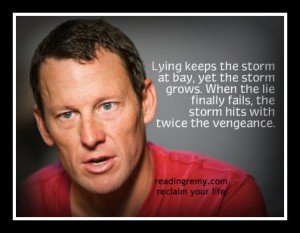Lance Armstrong and Why We Lie
You’ve probably heard by now that Lance Armstrong came clean to Oprah Winfrey about his use of performance-enhancing drugs as reported in the New York Times. He adamantly denied any illegal activity prior to this. Now, it’s clear that his involvement was extensive. Lying has always fascinated me. I’ve never understood it because when the lie comes out (which it almost always does) the person looks so bad and the consequences are so much worse.That’s true for Lance Armstrong. Some people believed in him, against all odds. He was so insistent on his innocence that they didn’t want to betray him. Now they realize: they are the one’s who were betrayed.
Lying has always fascinated me. I’ve never understood it because when the lie comes out (which it almost always does) the person looks so bad and the consequences are so much worse.That’s true for Lance Armstrong. Some people believed in him, against all odds. He was so insistent on his innocence that they didn’t want to betray him. Now they realize: they are the one’s who were betrayed.
The Beauty of a Lie
I spoke to a friend once about the thirteen years he hid an addiction by lying. I asked him what was going through his mind. How could he lie when he knew he couldn’t cover up forever and he knew he was hurting his family? He said he considered telling the truth many times, but every time he came close to coming clean he would weigh the cost vs. the benefits. Every time the cost of telling the truth was too great compared to telling the lie one more time. His reasoning was, Why suffer today when I can put it off and hopefully people will never find out?
Disgust for Lance Armstrong?
The psychology of a lie is amazing. It works against all reason. Yet in the moment it is so convincing. It’s really hard not to feel disgust for someone like Lance Armstrong. Every time he lied he put his own interests above others that loved him and were dedicated to his cause.
...or compassion for Lance Armstrong?
But I have to buffer my disgust for Lance Armstrong with a solid knowledge of the frailty of our humanity. As he said himself, he's flawed. God speaks in the Bible through the prophet Jeremiah and says: "The heart is hopelessly dark and deceitful, a puzzle that no one can figure out. But I, God, search the heart and examine the mind. I get to the heart of the human. I get to the root of things. I treat them as they really are, not as they pretend to be." (17:9,10)In other words, our hearts all have darkness: some more than others. So we need to be careful when showing “disgust”. Rather, it’s helpful to consider our own ability to fail, not to excuse wrong but to acknowledge that you too might have your own areas of denial. When you finally come clean you hope others treat you as you treated them...with compassion and not disgust.The apostle Paul said it well in a letter he wrote to Christians: If someone falls into sin, forgivingly restore him, saving your critical comments for yourself. You might be needing forgiveness before the day's out. Galatians 6:1. The problem with showing disgust is that we only reinforce people's hesitancy to come clean. They see the hatred and swear they'll never expose themselves to it. It's better to keep lying.
A Good Apology Can Help
I feel bad for Lance Armstrong and all the people he let down. He’s got years of mopping up to do. I wish he would have come clean earlier. I hope he doesn’t hold back and try to preserve his image. The best thing for his image now is full disclosure, true sorrow, and making as many amends as he possibly can. That might keep him busy for a few years. But he needs to be careful with his apology. A bad apology can add salt to a wound, not healing.To learn more about recovering from past failure see my chapter on “How to Be Reconciled” in my new book, STUCK...how to mend and move on from broken relationships.Feedback: What is your response to Lance Armstrong and his admission? Leave your comment below.